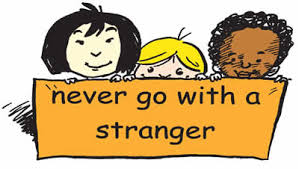|
Stranger Danger
It is very important that all children aware of potential danger from strangers – people they do not know. There are two things to remember:
- not all strangers are dangerous – some can be trusted,e .g. visitors to school, police officers
- some people children know might at times be dangerous
The greatest risk to children from strangers is when children are away from the family home or school and are alone or even with a small group of friends. This includes when:
- playing away from home
- walking to or from a friend’s house, the shops, etc.
- walking to or from school, including in the morning or late afternoon
- any of the above when it is dark
Strangers who may wish to hurt children might:
- approach children in the park
- approach children in a car
- try to give a child something, e.g. sweets, toys
- ask if they can borrow a belonging or money
- start a conversation
- ask for information or ask other questions, e.g. “How are you getting on a school?”
- pretend they know the child, a member of the family or another friend
- pretend they have been sent by the family to pick them up, take them home, etc.
- watch or follow a child
Our advice to parents is that:
- children are aware of ‘Stranger Danger’ advice (see below and overleaf)
- children are accompanied to and from school (to the playground) by an adult, if possible
- if not with an adult, children walk to and from school with other children, if possible
- children walk directly to and from school and do not deviate from, or loiter during, their journey
- if alone, a child’s journey to school includes some ‘safe places’ where they might stop, e.g. a trusted shop, doctor’s surgery, friend’s house, if they feel unsafe
|

|
- IGNORE the stranger and walk away
- NEVER approach a car, even if the driver opens the window or door to have a conversation
- DO NOT TALK to the stranger or share any information about themselves
- RUN TO SCHOOL or a safe place if they feel scared or the stranger persists in their approach
- NEVER give anything to or take anything (sweets, toy, etc.) from a stranger
- NEVER get in a car with a stranger or go home with someone they do not know
- SHOUT for help or shout ‘STOP! GO AWAY!’ at the stranger if they persist in their approach
- FIND A SAFE PLACE (including returning to school) if they feel they are unsafe
- REPORT the matter immediately to an adult at school or to parents, including by telephone
- INCLUDE the SCHOOL TELEPHONE NUMBER (0161 998 4825) in their contacts list on their mobile telephone, if they have one
|


